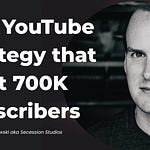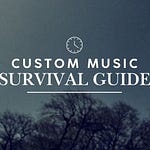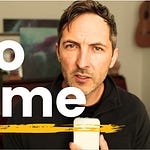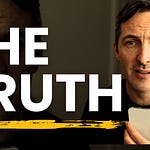This transcript is edited for clarity: - My Unfiltered Journey: How I Became a Full-Time Composer
This is the story of how my life got flipped, turned upside down. I mean, this is how I became a full-time composer.
Buckle in, this is going to be quite a long one.
The Seed of an Idea: Wanting to Write for a Living
I'm not going to go all the way back, but back to the point where I realised I wanted to write music for a living, or at least, that'd be my thing. This was before I went to university.
I was in a band and realised, "I want to write music like Danny Elfman".
I wanted to be a film composer.
So I found a university degree called Music and Visual Arts, where we studied music and art and the intertwining relationship between the two.
It was awesome. I ended up producing video work mostly. My final piece was a collection of video monitors, and on the videos, I had orchestrated a seven-minute-long piece using videos as the video score. It was very conceptual and sounded like a 70s horror movie, but it was a huge amount of fun.
Uni was brilliant because it exposed me to so many things.
However, my course itself wasn't specifically focused on music for the media.
So I took it upon myself to study outside of my university degree to teach myself the things I thought a composer needed. These included the ability to read music, use notation, and understand more advanced harmony beyond major and minor triads. It was a lot of fun. I would just spend my time reading classical music scores, listening to classical music, and training myself to be the composer I thought I needed to be.
The Leap of Faith: Saying "I'm a Composer" Before I Was
Fast forward to the end of my degree. I was telling everybody, "I'm going to be a film composer". I was literally telling everyone I was going to write music for a living.
It just so happened that my best friend was in a band, and they wanted some music to walk on stage to in the style of 24.
I was a massive fan of that TV show and its score by Sean Callery. So I wrote this piece of music with heartbeats and tension – basically, my first piece of production music.
The lead singer's girlfriend happened to work for a music publisher that worked in sync. My name got passed forward, and she asked me to send a reel over.
She liked one of the tracks and asked me to come in for a meeting. They told me they put music to ads and asked if I wanted to come on board as one of their composers. I was like, "hell yeah".
I remember the train journey home being like, "I've made it. I'm there. I'm a composer".
Little did I realise that, as with a lot of work, it's pro bono; you work for free until you land the job. But anyone who's worked in advertising knows that when you land a job, it pays very well, and the royalties can be very, very good. So advertising is pretty ace.
The Grind: Teaching and Composing on the Side
None of this was paying the bills and I had to bring in some money.
So I started teaching music in schools.
I was a classical and electric guitarist, and I did whole-class music lessons. I would teach part-time through the week whilst responding to ad briefs.
These ad briefs were amazing because I'd get between one and three of them every day. The deadlines were usually very tight. They'd often send an existing catalogue and ask, "Do you have anything like this?".
I'd say, "yep", and spend the next two hours writing a piece of music to fit that brief.
It was amazing practice.
Sidenote - You can do the same with Taxi now; they send briefs every day, and you can practice your writing skills.
I was writing to brief every single day, sending tracks off.
Most of the time, my tracks got nowhere, with no feedback.
Sometimes, one would get to the next round, but more often than not never wnet anywhere.
Small Wins & Big Breakthroughs
This continued for three years. The first job I landed was a Hewlett-Packard online ad, which paid £500. At the time, that felt massive because it was about two weeks of my teaching income.
In those three years, nothing happened apart from that ad.
Then, in the third year, I landed a Nokia internet thing, which paid about a thousand pounds, which was huge.
But little did I know, around the corner was my first big placement: a national TV ad for a cheese company. The ad fee was £10,000 for the year, which, back then, would be matched in royalties, and it did. They re-licensed that for two more years.
That was massive. I had my first big national TV ad and suddenly got a bit more respect because I'd landed something. I had something on my showreel that wasn't just an internet ad.
All of a sudden, I felt like the real deal; I felt like I was a composer.
I started getting other smaller things too, but despite this, nothing enabled me to stop teaching in schools as a part-time job.
Then, I got my first gig writing for a production music library. I’d write an album based on their brief, and they'd pitch it. I really enjoyed this work.
It never really landed anything massive, but I got a few TV promos from it, which were brilliant for my showreel.
At this point, after three to four years of part-time composing whilst teaching, I was feeling a little bit frustrated.
Then I started working in trailers.
One of the production music companies I worked for said, "Hey, I know these guys in LA, they do trailer stuff. Do you fancy having a go?". I was like, "Trailer music is a thing?" I thought it was just film scores. I got with them, that was Pusher Music - an excellent bunch of people who taught me so much about writing trailer music.
I landed my first trailer with them: Men in Black 3, Trailer 3.
The Turning Point: Frustration & The Leap of Faith
It got to this point: my wife was pregnant with our firstborn.
This was now approaching six years of part-time composing, and I was feeling really frustrated. I had been taking the money I got paid for music and creating a runway, which I strongly advise any composer to do.
By this point, I knew other composers who started after I did, and they were full-time already. Some were jetting off to LA to work with big composers, or landing big trailers or ads. I was feeling really frustrated because I wasn't getting anywhere.
I decided to just get off the fence.
I talked endlessly to my wife about it, saying, "Oh, I'm scared to give up teaching because it's my consistent income".
She was like, "Just do it".
It felt like that scene in Indiana Jones: "only the penitent man shall pass". So I had to step faithfully onto the invisible bridge.
So, I put in my notice for teaching, quitting my job.
And lo and behold, I landed two IBM TV ads, and I got approached by a Japanese film company to score their summer blockbuster.
That was me off to the races.
That was me, after six years, nearing seven, going full-time.
And it felt incredible.
Key Lessons from My Journey
This is me sharing my experience of going full-time as a composer. I know loads of composers who went full-time much quicker than I did.
It Might Take Longer Than You Think - but that doesn’t mean it won’t happen.
It's Hard (Despite Social Media's Portrayal) - you have to have a lot of resilience and tenacity.
The Power of Belief & Purpose is paramount - What gets you through that difficulty is having a clear goal and a deep-seated belief that it's what you're meant to do, and that you will achieve that purpose no matter what.
Embrace Every Opportunity (Wisely) - You never know where it will lead.
Remember why you started in the first place: I have achieved what my previous self would have deemed the utmost success – earning a really good living from writing music. It's wonderful, but for me, it wasn't everything. I didn't realise that until I got to that point, and I kind of wanted to give back. This is me doing service for other composers, looking back down the mountain and being like, "Hey guys, this path is simpler". But also taking some time to nourish my own soul by writing music just for me. It's really, really important. It's great to be completely focused on your career, but remember why you started in the first place. It wasn't to earn loads of money. There's a call inside of us to make music. You have to hold on to that. So no matter where you are in your journey, I applaud you. Keep going. Stay positive. Stay focused on that feeling, that joy that music gives you.
My "Why" and The Composer Academy
This is one of the reasons I have decided to launch my program, The Composers Academy.
My "why" is so important here.
It's all very well that I have like 25 courses where you can learn a huge amount from my experience. But having a place, a community where you can be with other composers who are doing similar things, feeling the same struggles and wins, having a connection with these fellow composers, is incredibly important.
So keep those connections.
Keep hold of that fire in your belly and that passion.
I'm really grateful that you listened and watched (and read).
You are awesome, and keep being awesome. If you enjoyed it, sign up for my email list, where I talk about the wins, the struggles, the tips, and tactics of being a composer.








